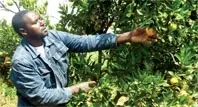HARSH WEATHER, GLOBAL economic meltdown and the negative effects of the post-election violence have hit hard this vital lifeline of thousands of Kenyan farmers. Reduced demand for horticultural products- particularly in Europe has seen exports plummet by 7.4 percent in the first half of 2009, according to the Central Bank of Kenya estimates.
“Roses which constitute over 70 per cent of the total flowers exported, declined by 7.4 per cent due to depressed demand from the country’s traditional markets”, noted a July 2009 CBK report. On the other hand, the Chief Executive Officer (CEO) of the Fresh Produce Exporters Association of Kenya, Dr Stephen Mbithi observed that 2009 indicates a 30 per cent decline due to drought and slow economic growth. The horticultural sector employs over 60,000 workers directly and another 500,000 indirectly, according to horticultural players. In 2008, the sector produced 6.6mn tonnes of produce valued at US$1.7mn.
In 2008, the sector earned an estimated US$532mn in foreign exchange. The European Union (EU) is the largest export market for horticultural products from the country. The government estimates that at least 4.5mn Kenyans benefit from the sub-sector as producers, consumers and other players. Kenya an important producer in Africa Kenya’s favourable weather particularly the Equatorial climate allows production throughout the year making the country an important producer in Africa. While most the products for the export market originate from large outfits in Thika, Timau and Naivasha, smallholder farmers play a bigger role in overall sector output. According to the Horticultural Crops Development Authority (HCDA)- the market regulator, only 6 per cent of the total volumes produced is exported while the 94 per cent is consumed locally. Most of the produce consumed locally comes from smallholder farmers.
The sector has increasingly been faced by many challenges even as the global economic fortunes seem to be getting better. Poor infrastructure, unpredictable weather, high costs of farm inputs, obsolete technology and stringent international standards are some of the challenges the sector continues to face. Competition from Ethiopia’s fledging cut flower industry has also threatened Kenya’s dominance in Africa. “ The low participation of the smallholder farmers in the export markets is due to stringent consumer demands for high quality and safer production laid down by the market demands”, said William Ruto, Kenya’s Agriculture minister. But Ruto also lamented on high cost of production has hampered the bigger participation of smallholder producers.
“Higher power costs, rising fuel prices, cost of inputs, foreign currency exchange rates, high transportation cost and poor infrastructure such as roads and water threatens the country’s stronghold in the market”, warned the minister at an All Africa Horticulture Congress in Nairobi. High post-harvest losses Due to poor infrastructure, Ruto noted, there was high post-harvest losses experienced in the domestic markets. But the sector players and the government are working hard to overcome some of these challenges and retain the country as the top destination for flowers and fresh produce exporters.
Chief among them has been the seeking of new markets and diversify from the traditional European markets. “ HCDA will work closely with the horticultural players and the government in tapping new markets in the US, China, Middle East, Eastern Europeans and other African markets”, said Dr Alfred Serem, HCDA managing director. Already, the Emirates Airline-which handles 19 per cent of the horticultural cargo leaving the Jomo Kenyatta International Airport - has promised to boost its capacity mainly to the Middle Eastern markets.
Hopes were high in 2008 when Delta Airlines announced the commencement of direct flights between Nairobi and the US. However, all was lost when the airline cancelled the planned flights at the last minute. But the government now want to access the huge US markets though sea transport. “We intend to use a new technology which can preserve and keep horticultural produce fresh for two months. This will enable us to reach the enormous and rich American market by ship”, said Romano Kiome, Agriculture ministry Permanent Secretary. Kiome also reported that entering the Far East markets of China and Japan will require Kenya’s fruits, vegetable and flowers to be of high quality standards.
“Consumers are getting more concerned about the quality of what they are eating making it fundamental to ensure quality and more importantly safety”, observed Kiome. Concerns from the UK consumers for Kenyan produce to meet high quality standards is s typical case study. In a positive note, the Kenya Plant Health Inspectorate Service (KEPHIS) reports that increased awareness through the inspectorate among farmers and traders has reduced incidences of pests in produce for export.
“Through our early warning systems, we are training farmers and traders on how to use modern equipment to identify insects. As a result, as the volumes increase, the cases of pests found in consignments have gone down to 45 from a high of 280 in the last year”, said Changema Kidera, KEPHIS managing director. In another related development, the Kenya Flower Council ( KFC) has become the first growers association to be certified to audit flower farms.
“It now means that our mark of quality is acceptable internationally,” said Mrs. Jane Ngige, KFC’s chief executive officer. This means Kenya can now audit other African countries which have had to rely on costly international auditors. Previously, this has been a preserve of highly skilled personnel Western-based international inspection firms. At the same time, flower exporters want their sector included in the proposed Special Economic Zones (SEZs) in order to enjoy more incentives from the government.
The Kenya Flower Council (KFC) chairman Muito Kabuya has said that despite investing heavily in industry, the sector is yet to benefit from the existing incentive schemes. Under the SEZs, the exporting companies will enjoy better services like roads and will be exempted from levies like Value Added Tax on electricity. The United States Agency for International Development (USAID) says that if properly exploited, the horticultural sector in the country can reach between 15 and 20 per cent growth.





